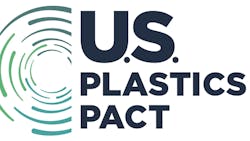U.S. Plastics Pact calls for elimination of more materials by 2030
The U.S. Plastics Pact has released an updated report detailing its ongoing, accelerated action to eliminate problematic and unnecessary materials from the plastics value chain.
“This report furthers our mission to support our member-Activators in achieving their objectives by providing clear, actionable guidance on eliminating materials that do not align with a circular economy,” said Jonathan Quinn, CEO of U.S. Plastics Pact.
The pact’s previous report highlighted 11 items to be eliminated by 2025, and the new report points to additional materials to be eliminated or redesigned by 2030. Key materials identified for elimination include:
- Non-compostable produce stickers: Targeted for elimination by 2030, these stickers are being replaced by compostable alternatives, aligning with industry efforts to reduce compost contamination and compost more food waste.
- Multi-material plastic packaging: Innovations in packaging design and modernized manufacturing infrastructure are crucial for phasing out these materials by 2030.
- Degradability additives: These additives have been shown to disrupt recycling and composting processes. Oxo-degradable additives are set for elimination by 2025, and all other degradability additives are set for elimination by 2030.
U.S. Plastics Pact’s targets explicitly call for the development of policies at all levels of government that support reuse, recycling, composting and the incorporation of post-consumer recycled content in packaging.
